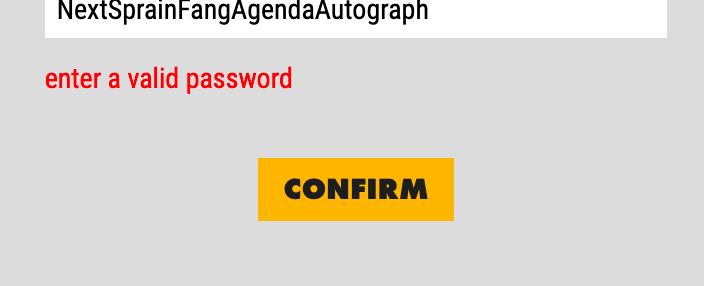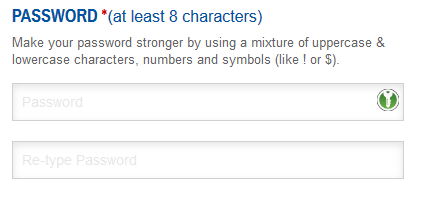Ch-ch-ch-changes
-
Thanks to the report in KeePassXC which highlights weak passwords, I noticed my password for the Dewalt site was just a 6 digit number. I couldn't remember why I'd have set it to something so shit, so went to change it.
This is the change password page. Unedited. It really has text boxes not password boxes.


Submitting the password tells you to enter a valid password, but not what a valid password requires.
I tried:
- a longer passphrase than the one in the screenshot
- a shorter passphrase
- passphrase with added numbers and/or special characters
- randomly generated mix of letters, numbers and special characters
Nope. None of them valid. By this point I'd realised the likely cause of the original password being 6 digits.
I tried a few longer numbers to no avail.It only accepts 6 digit numbers.
-
@loopback0 said in Ch-ch-ch-changes:
Thanks to the report in KeePassXC which highlights weak passwords, I noticed my password for the Dewalt site was just a 6 digit number. I couldn't remember why I'd have set it to something so shit, so went to change it.
This is the change password page. Unedited. It really has text boxes not password boxes.


Submitting the password tells you to enter a valid password, but not what a valid password requires.
I tried:
- a longer passphrase than the one in the screenshot
- a shorter passphrase
- passphrase with added numbers and/or special characters
- randomly generated mix of letters, numbers and special characters
Nope. None of them valid. By this point I'd realised the likely cause of the original password being 6 digits.
I tried a few longer numbers to no avail.It only accepts 6 digit numbers.
I've taken to using Inspect on the password box to see if there are any rules. By default I use KeyPass' 256bit hash generator that I tweak but a lot of sites have limits set to 36 or 50 chars without telling you.
-
@mikehurley said in Ch-ch-ch-changes:
I've taken to using Inspect on the password box to see if there are any rules.
I did check but, unsurprisingly in this case, there are not.
@mikehurley said in Ch-ch-ch-changes:
By default I use KeyPass' 256bit hash generator that I tweak but a lot of sites have limits set to 36 or 50 chars without telling you.
Normally I let KeePassXC generate a passphrase and then make tweaks to it.
-
Another one:

If you mouse over the
 there's a tooltip which shows the attempted password in plain text.
there's a tooltip which shows the attempted password in plain text.
-
@loopback0 said in Ch-ch-ch-changes:
Another one:

If you mouse over the
 there's a tooltip which shows the attempted password in plain text.
there's a tooltip which shows the attempted password in plain text.
Not their fault you're changing your password from a public computer

-
@loopback0 TRWTF is "password boxes" that obscure the text.
-
@gordonjcp said in Ch-ch-ch-changes:
@loopback0 TRWTF is "password boxes" that obscure the text.
That’s a sensible default. TRWTF are password boxes that don’t have an option to view the the text un-obscured.
Or the way windows does it where you have to keep the mouse button pressed to view it. Try copying out of the text box while keeping the mouse pressed on the view icon.
-
@mikehurley said in Ch-ch-ch-changes:
a lot of sites have limits set to 36 or 50 chars without telling you.
I even encountered a few sites that truncated your password before saving it to their database, but not when comparing them.* Figuring out why the password I literally just set a few seconds ago didn't work was "fun".
*Yes, passwords, not their hashes, because I'm not so sure those crappy sites hash passwords at all. Otherwise, why silently truncate when saving, but not before hashing?
-
@dfdub said in Ch-ch-ch-changes:
Otherwise, why silently truncate when saving, but not before hashing?
"No reason" is an entirely realistic scenario.
-
@dfdub "Oh, you offer to run these 2GB of data through PEBKAC2 for me on your server? Why thank you, I'll take that and tell all my friends" is an actual DoS consideration.
At 5 bit of entropy per character (which is roughly single-case and digits minus some confusable ones), that's still 180-250 bits of entropy. That's quite possibly stronger than the root private key securing the CA that issued the cert for the TLS connection you're sending it over.
-
@uschwarz-0 That's reason to truncate it on both password reset and in the login process. But they're only doing the first, so the site is still open to that DoS attack.
-
@dfdub said in Ch-ch-ch-changes:
I even encountered a few sites that truncated your password before saving it to their database, but not when comparing them.* Figuring out why the password I literally just set a few seconds ago didn't work was "fun".
I've had one site that silently truncates both.
Figuring out which bit of one of my (short) unit tests was failing took about 2 hours until I figured out that's exactly what they were doing. (Was trying to test for API login failure, and the test simply kept successfully logging in. Turns out they silently truncated at 72; my password was 128, and for my attempt at the failure test I simply copied the attempt at successfully logging in and chopped off a few characters at the end. My subsequent security report to them, likewise, was silently truncated - never heard back from them.)
-
@uschwarz-0 said in Ch-ch-ch-changes:
At 5 bit of entropy per character (which is roughly single-case and digits minus some confusable ones), that's still 180-250 bits of entropy. That's quite possibly stronger than the root private key securing the CA that issued the cert for the TLS connection you're sending it over.
When using a passphrase, the amount of entropy per character is significantly lower than that.
-
@PleegWat said in Ch-ch-ch-changes:
@uschwarz-0 said in Ch-ch-ch-changes:
At 5 bit of entropy per character (which is roughly single-case and digits minus some confusable ones), that's still 180-250 bits of entropy. That's quite possibly stronger than the root private key securing the CA that issued the cert for the TLS connection you're sending it over.
When using a passphrase, the amount of entropy per character is significantly lower than that.
My master passphrase for my password manager is long. When I created the passphrase, it reported the strength, and the number of bits it calculated accumulated quickly, but as I continued typing, the rate dropped off. The last 10 (or more) characters of the passphrase added only a single bit of entropy.
-
@PleegWat said in Ch-ch-ch-changes:
When using a passphrase, the amount of entropy per character is significantly lower than that.
Passphrases are typically a tradeoff between the desire for high entropy and the desire for keeping the secret not written down on a piece of paper underneath the keyboard (or even on a postit on the monitor!) and as such are nothing like as random as 128 bits of pure random data… but nobody normal remembers that shit, and guessing the passphrase (as opposed to all the other possible ones) is sufficiently non-trivial.
-
Curious how they entropy of a passphrase is accounted for if the attacker doesn't know you used a passphrase. Who knows, maybe you're just a weirdo who can memorize a 50 character "traditional" password no problem.
-
@coderpatsy said in Ch-ch-ch-changes:
maybe you're just a weirdo who can memorize a 50 character "traditional" password no problem.
Probability of that: very low. If it happens, look for SHA-512 collisions in your data.

-
@coderpatsy said in Ch-ch-ch-changes:
Curious how they entropy of a passphrase is accounted for if the attacker doesn't know you used a passphrase. Who knows, maybe you're just a weirdo who can memorize a 50 character "traditional" password no problem.
The attacker doesn't know your length. They only know, within the password constraints set by the site, what proportion of passwords typically use passphrases, and you can add some entropy for that on top of the basic entropy of the passphrase (which is number of words times the log₂ of the number of words in your dictionary, if the words are random)
-
@PleegWat said in Ch-ch-ch-changes:
The attacker doesn't know your length. They only know, within the password constraints set by the site, what proportion of passwords typically use passphrases, and you can add some entropy for that on top of the basic entropy of the passphrase (which is number of words times the log₂ of the number of words in your dictionary, if the words are random)
That's not a passphrase, which are often more structured. (Phrases have somewhat lower entropy, but much greater retention by humans.)
-
@dkf The trick with e.g. diceware is that you pick random words and then build a phrase connecting them in your head. And because the secret is made up of multiple words I would argue that it can still be called a passphrase, even if it ain't a meaningful sentence.
Once you start using movie quotes, song lyrics, ... you open yourself up to dictionary attacks because people are bad at picking a random one, so I wouldn't restrict the definition of passphrase to just that.
-
@JBert yes, if you limit the definition of passphrase to "to be or not to be, that is the question" then every cracking dictionary will contain it. The xkcd correct horse battery staple phrases will have much more entropy (except this one, of course).
-
My existing password that's previously been set is too long for the login page


Urgh. Fine. I go to reset it, but the validation on password also disables the "Forgot password?" link

Naturally the set password page doesn't tell you the maximum is 20 characters.

Also the validation event fires on mouseout, and if you click into the first textbox it instantly sets focus on the second and complains neither have been filled in even though you can't actually fill them in because of the validation firing.
